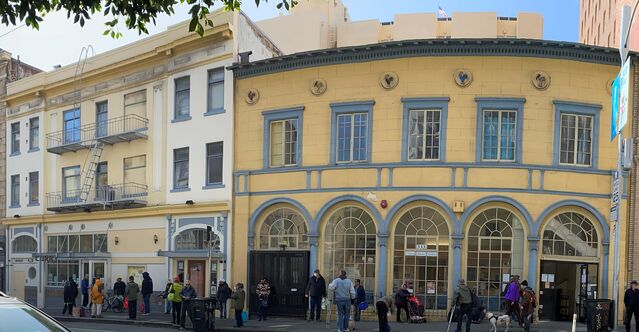Loneliness
Overcoming Loneliness in Today's COVID World
New research on the power of community outreach to promote greater well-being.
Posted November 22, 2021 Reviewed by Tyler Woods
Key points
- Research shows that loneliness and isolation are bad for our health.
- COVID restrictions have isolated us even further.
- What one resourceful community center shows us about the power of building connections.
Research tells us that social isolation and loneliness are hazardous to our health (Cacioppo et al, 2002; Hari, 2018; Ong, Uchino, & Wethington, 2015). We all need connections and community. Yet the COVID-19 pandemic has reduced personal contact and raised the risk of loneliness, especially among vulnerable populations (Killgore, Cloonan, Taylor, & Dailey, 2020).

Interdisciplinary social scientist and research specialist T. Anne Richards has learned this lesson firsthand. At the Public Health Institute in Oakland, she researched and developed a program to reduce social isolation in underserved populations. Ms. Richards is retired from the University of California, San Francisco at Berkeley, where she spent 16 years in HIV/AIDS research with a focus on the spiritual aspects of caregiving, bereavement, and recovery from grief. She now works as a consultant at the Curry Senior Center in San Francisco. The Center serves low-income older adults from diverse racial and ethnic backgrounds. Many have chronic illnesses, little or no family support, and live in single-room occupancy (SRO) hotels.
Picture this—a man or woman over 60, struggling with poverty and chronic illness, living in a single room with only a small fridge and hot plate. Curry Senior Center has developed a range of programs to support them, including cooking classes on how to shop at corner stores and cook a nourishing meal in an SRO.
Curry Senior Center’s programs include phone outreach, peer-to-peer connections, technology classes, case management and behavioral health, and primary and preventative care through a partnership with a Department of Public Health clinic. Technology support programs provide training and equipment to help clients learn necessary skills for staying connected virtually, with additional support for health care self-management. There is a drop-in center, open every day of the year, offering a safe space to come in off the streets and engage in support and social programs. A peer program matches clients with staff members who have also lived experiences of homelessness, SRO living, and dealing with the mental health system. Meeting with these peers, Richards says, “slowly develops a trusting relationship—for caring, for listening, sometimes taking them to doctor’s appointments or grocery shopping. They became a primary support in the lives of these older adults.”

When COVID-19 hit, the Curry Center continued to reach out. Richards says that, “what COVID did was push the envelope to make connections with people that we knew were out there alone in these rooms and make sure they had phone calls or Zoom meet-ups for computer discussions, technology support, and basic inquiries about their health from staff, health coaches and volunteers, and discussions about what they could do to support themselves during this time.” The goal, Richards explains, was to, “make people feel like there was somebody out there who cared about them, who was thinking of them, somebody out there that they could call if they needed help. And when you are alone in a single room and you have very little family and friends, a very very small social network, and a very limited income, to know that someone is there and cares for you becomes critical.”
Programs like this offer a vital lifeline to isolated low-income older adults. Research published this year about the Curry Center’s programs in the Journal of the American Geriatric Society showed significant reductions in depression and increases in well-being among the people they serve. Positive psychology research has shown that personal connections are essential for our health and well-being, and can restore our hope (Bertera, 2005; iFred, 2021).
Research also reveals that reaching out to connect creates community, benefiting both the giver and receiver. Richards says, “I feel so blessed to be able to continue this work, to have opportunities to participate in life in this way. It’s one of the things in my life that I am most grateful for.” Psychologist Barbara Fredrickson (2013) has found that simple acts of connection can dramatically improve our health, raise our mood, relieve stress, and reduce inflammation to promote greater physical and emotional well-being for individuals and communities in a positive ripple effect.
References
Bertera, E. M. (2005). Mental health in US adults: The role of positive social support and social negativity in personal relationships. Journal of Social and Personal Relationships, 22(1), 33-48.
Cacioppo, J. T., Hawkley, L.C., Crawford, E., Ernst, J.M., Burleson,M.H., Kowaleswski, R.B., Malarkey, W. B., Van Cauter, E., & Berntson, G.G. (2002). Loneliness and health: Potential mechanisms. Psychosomatic Medicine 64, 407-417.
Fredrickson, B. (2013). Love 2.0: How our supreme emotion affects everything we feel, think, do, and become. New York, NY: Hudson Street Press.
Hari, J.(2018). Lost connections: Uncovering the real causes of depression—and the unexpected solutions. New York, NY: Bloomsbury.
International Foundation for Research and Education on Depression (iFred). (2021). The Hopeful Cities Project https://hopefulcities.org/know-the-five-keys/. See also The Hopeful Mindsets Project. https://hopefulmindsets.com/
Killgore, W.D.S., Cloonan,S.A., Taylor, E. C., & Dailey, N.S. (2020, August). Loneliness: A signature mental health concern in the era of COVID-19. Psychiatry Research, 290, 113-117.
Kotwal, A. A., Fuller, S.M., Myers, J. J., Hill, D., Tha, S. H., Smith, A. K., & Perissinotto, C.M. (2021, August ). A peer intervention reduces loneliness and improves social well-being in low-income older adults: A mixed-methods study. Journal of the American Geriatrics Society, early online version, 1-12. doi: 10.1111/jgs17450
Ong, A.D.,Uchino, B. N., & Wethington, E. (2015). Loneliness and health in older adults: A mini-review and synthesis. Gerontology, 62, 443-449.


